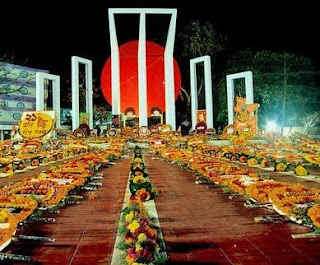Bangladesh became one of the large nation states in 1971 when it seceded from Pakistan. Prior to the creation of Pakistan in 1947, modern-day Bangladesh was part of ancient, classical, medieval and colonial India.
Since independence, the government has experienced periods of democratic and military rule. The founding leader of the country and its first president was Sheikh Mujibur Rahman. His daughter Sheikh Hasina Wazed is currently the prime minister, as leader of the Awami League. The opposition Bangladesh Nationalist Party is led by Begum Khaleda Zia, who is the widow of the revered freedom fighter and former president Ziaur Rahman.
After the Awami League won all the East Pakistan seats of the Pakistan's National Assembly in the 1970-71 elections, West Pakistan opened talks with the East on constitutional questions about the division of power between the central government and the provinces, as well as the formation of a national government headed by the Awami League.
The talks proved unsuccessful, however, and on March 1, 1971, Pakistani President Yahya Khan indefinitely postponed the pending National Assembly session, precipitating massive civil disobedience in East Pakistan.
On March 2, 1971, a group of students, led by A S M Abdur Rob, student leader & VP of DUCSU (Dhaka University Central Students Union) raised the new (proposed) flag of Bangla under the direction of Swadhin Bangla.
On March 3, 1971, student leader Sahjahan Siraj read the Sadhinotar Ishtehar (Declaration of independence) at Paltan Maidan in front of Bangabandhu Shaikh Mujib along with student and public gathering.
On March 7, there was a historical public gathering in Paltan Maidan to hear the guideline for the revolution and independence from Shaikh Mujib, the frontier leader of movement that time. Although he avoided the direct speech of independence as the talks were still underway, he influenced the mob to prepare for the separation war. The speech is still considered a key moment in the war of liberation, and is remembered for the phrase, "Ebarer Shongram Muktir Shongram, Ebarer Shongram Shadhinotar Shongram...." ("This time, the revolution is for freedom; this time, the revolution is for liberation....").
After the military crackdown by the Pakistan army began during the early hours of March 26, 1971 Bangabandhu Sheikh Mujibur Rahman was arrested and the political leaders dispersed, mostly fleeing to neighbouring India where they organized a provisional government afterwards. Before being held up by the Pakistani Army Sheikh Mujibur Rahman gave a hand note of the declaration of the independence of Bangladesh and it was circulated amongst people and transmitted by the then East Pakistan Rifles' wireless transmitter. Bengali Army Major Zia-Ur-Rahman captured Kalurghat Radio Station in Chittagong and read the declaration of independence of Bangladesh. Later that day, Major Zia read the declaration of independence on behalf of Sheikh Mujibur Rahman,
"I, Major Zia-ur-Rahman,on behalf of our great national leader and supreme commandar Sheikh Mujibur Rahman do hereby proclaim the independence of Bangladesh."
The Provisional Government of the People's Republic of Bangladesh was formed in Meherpur, (later renamed as Mujibnagar a place adjacent to the Indian border). Sheikh Mujibur Rahman was announced to be the head of the state. Tajuddin Ahmed became the prime minister of the government. There the war plan was sketched with armed forces established named "Muktibahini" (freedom fighters).M. A. G. Osmani was assigned as the Chief of the force. The land sketched into 11 sectors under 11 sector commanders. Along with this sectors on the later part of the war Three special forces were formed namely Z Force, S Force and K Force. These three forces name were derived from the initial letter of the commandar's name. The training and most of the arms and ammunitions were arranged by the Meherpur government which were supported by India. As fighting grew between the Pakistan Army and the Bengali Mukti Bahini, an estimated ten million Bengalis, mainly Hindus, sought refuge in the Indian states of Assam, Tripura and West Bengal.
The crisis in East Pakistan produced new strains in Pakistan's troubled relations with India. The two nations had fought a war in 1965, mainly in the west, but the pressure of millions of refugees escaping into India in autumn of 1971 as well as Pakistani aggression reignited hostilities with Pakistan. Indian sympathies lay with East Pakistan, and on December 3, 1971, India intervened on the side of the Bangladeshis. On December 16, 1971, Pakistani forces surrendered, and the nation of Bangla Desh ("Country of Bengal") was finally established the following day. The new country changed its name to Bangladesh on January 11, 1972 and became a parliamentary democracy under a constitution. Shortly thereafter on March 19 Bangladesh signed a friendship treaty with India.

0 comments:
Post a Comment